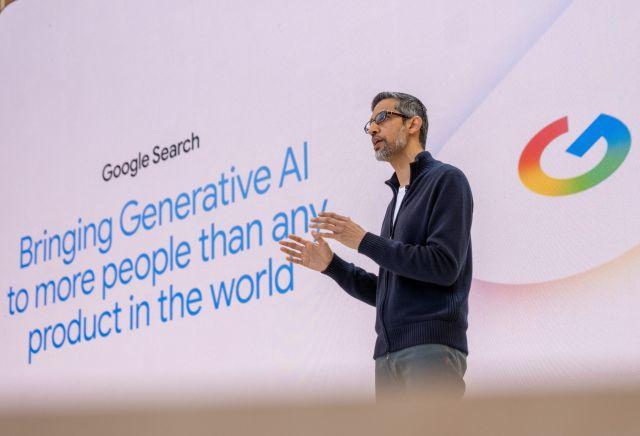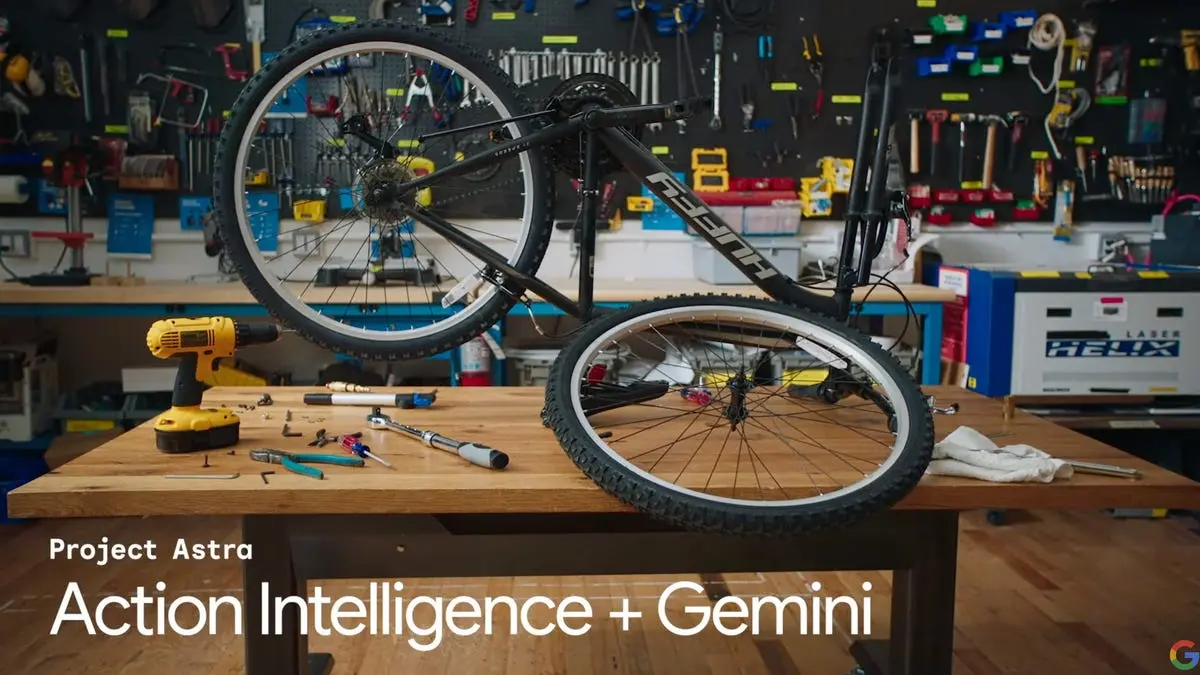Google Unveils Agentic AI Capabilities Across Products at I/O 2025
3 Sources
3 Sources
[1]
Google I/O 2025: From research to reality
We're also bringing capabilities like these to products like Search. We think of agents as systems that combine the intelligence of advanced AI models with access to tools, so they can take actions on your behalf and under your control. Our early research prototype, Project Mariner, is an early step forward in agents with computer-use capabilities to interact with the web and get stuff done for you. We released it as an early research prototype in December, and we've made a lot of progress since with new multitasking capabilities -- and a method called "teach and repeat," where you can show it a task once and it learns plans for similar tasks in the future. We're bringing Project Mariner's computer use capabilities to developers via the Gemini API. Trusted testers like Automation Anywhere and UiPath are already starting to build with it, and it will be available more broadly this summer. Computer use is part of a broader set of tools we'll need to build for an agent ecosystem to flourish. Like our open Agent2Agent Protocol, so that agents can talk to each other, or the Model Context Protocol introduced by Anthropic, so agents can access other services. And today, we're excited to announce that our Gemini API and SDK are now compatible with MCP tools. We're also starting to bring agentic capabilities to Chrome, Search and in the Gemini app. For example, a new Agent Mode in the Gemini app will help you get even more done. If you're apartment hunting, it will help find listings that match your criteria on websites like Zillow, adjust filters and use MCP to access the listings and even schedule a tour for you. An experimental version of Agent Mode in the Gemini app will be coming soon to subscribers. And it's great for companies like Zillow, bringing in new customers and improving conversion rates. This is a new and emerging area, and we're excited to explore how best to bring the benefits of agents to users and the ecosystem more broadly.
[2]
Google Says Gemini's Agent Mode Will Finally Turn Its AI into a Real Personal Assistant
Khamosh Pathak is freelancer tech journalist with over 13 years of experience writing online. It's 2025, and Google is now bringing its own agentic AI feature to the Gemini app. While the company has discussed agentic AI prototypes before, it now seems ready to take them mainstream. At the Google I/O 2025 keynote, Google discussed how the new feature can go out on the web on its own and perform tasks for you. Just like OpenAI's Operator, it can take a prompt, make a checklist of things that need to be done, and then do them for you. According to Google, Agent Mode combines features like live web browsing and deep research with data integration from Google apps to accomplish its online tasks. The model is supposedly capable of executing multistep actions, start to finish, with minimal oversight from the user. We still don't know a lot about how exactly the feature will work, but Google gave us an example on stage. Here, Sundar Pichai asked Gemini to find a new apartment for rent within a limited budget, and with access to built-in laundry. Gemini then made a task list for things to do, like opening a browser, navigating to Zillow, searching for listings that match, and even booking a tour. All of this is possible because Google is using MCP in the background. Model Context Protocol (introduced by Anthropic) is a new industry-wide protocol that web developers and apps can use to integrate directly with AI tools. In this example, Google can search through Zillow and book a tour using the protocol, which is much more reliable than spinning up a web browser and asking AI to click some buttons for you. Agentic capabilities aren't only limited to the Gemini app's Agent Mode. Google is also bringing a more modest version of them to Chrome, and Google Search. For example, Agentic features in AI mode can help you search for game tickets in the background. According to Google, Agent mode will be coming soon to the US as an early preview for the new Google AI Ultra plan, which costs $250 per month. There's no word on wider availability yet.
[3]
Google Shows Just How Smart Agentic A.I. Has Become at I/O Developers Conference
At I/O 2025, Google introduced a powerful wave of agentic A.I. tools designed to perceive, act and create with minimal user input. At Google's I/O developers conference this week, CEO Sundar Pichai demonstrated Google's latest progress in agentic A.I., systems that mirror key aspects of human behavior and are capable of carrying out multi-step tasks with minimal prompting. "We think of agents as systems that combine the intelligence of advanced A.I. models with access to tools. They can take actions on your behalf and under your control," Pichai said onstage. Sign Up For Our Daily Newsletter Sign Up Thank you for signing up! By clicking submit, you agree to our <a href="http://observermedia.com/terms">terms of service</a> and acknowledge we may use your information to send you emails, product samples, and promotions on this website and other properties. You can opt out anytime. See all of our newsletters Agentic features are now rolling out across Google's product lineup, from Chrome and Search to the Gemini app. For example, Gemini Live, a new feature within the Gemini app, allows the A.I. assistant to "see" through a user's phone camera and read on-screen content -- building on last year's Project Astra, a prototype that could respond to spoken questions with visual awareness. Pichai described Gemini Live as "the start of a universal A.I. assistant capable of perceiving the world around you." During a demo, Gemini Live interpreted real-world objects, answered environment-based questions, and collaborated across apps to help users complete tasks. Pichai also introduced Project Mariner, an advanced A.I. agent developed by Google DeepMind. Initially released as a research prototype in December, Mariner can now browse and interact with websites autonomously, conducting tasks such as filling out forms and completing transactions. Project Mariner is behind "Agent Mode," a new Gemini feature that allows users to delegate tasks like apartment hunting, booking appointments or trip planning. "We are introducing multitasking in Gemini, and it can now oversee up to 10 simultaneous tasks," Pichai said. "It's also using a feature called teach and repeat -- where you show it a task once, and it learns how to handle similar ones in the future." For instance, Gemini can find listings on sites like Zillow and apply very specific filters on the user's behalf. Agentic A.I. takes Google's creative suite to another level Some of the most striking announcements at this year's I/O conference came from Google's creative A.I. suite, where agentic intelligence is used to revolutionize content production. Pichai debuted Veo 3, the latest generative video model capable of producing cinematic-quality clips with synchronized sound and intricate visuals. He also introduced Imagen 4, an upgraded image-generation model, and Flow, an agentic filmmaking assistant that can expand a single clip or prompt into a full scene. Unlike traditional tools that require step-by-step direction, Flow can transform a rough idea into a polished, Hollywood-style production with minimal input. These advancements, Pichai noted, are powered by Google's Gemini 2.5 Pro architecture and its next-generation TPU hardware, Ironwood. Built for speed and efficiency, Ironwood enables large-scale, real-time A.I. workloads at reduced cost -- an essential requirement for agentic A.I., which must process audio, visual and contextual data continuously to act in real time. Gemini 2.5 now supports not just the Gemini app and creative tools but also Google Search and its AI Overviews, offering more advanced reasoning and responsiveness. In A.I. mode, users can input queries two to three times longer and more complex than traditional searches. Pichai also previewed new multi-turn interactions in Search, allowing users to ask follow-up questions in a conversational flow -- a feature reminiscent of Perplexity AI. "This is an exciting moment for A.I.," Pichai said. "We're just beginning to see what's possible when A.I. understands more of the world around you -- and can take meaningful action."
Share
Share
Copy Link
Google introduces advanced agentic AI features in Gemini, Chrome, and Search, showcasing autonomous task completion and enhanced user interaction capabilities.
Google Unveils Agentic AI at I/O 2025
At the Google I/O 2025 developers conference, CEO Sundar Pichai introduced a suite of agentic AI capabilities across Google's product lineup, marking a significant leap in artificial intelligence technology. These advancements aim to provide users with more autonomous and efficient digital assistance
1
.
Source: Observer
Agent Mode in Gemini App
The centerpiece of Google's agentic AI rollout is the new Agent Mode in the Gemini app. This feature combines advanced AI models with access to tools, allowing the system to perform complex tasks on behalf of users
1
. For instance, when apartment hunting, Agent Mode can:- Search listings on websites like Zillow
- Apply specific filters based on user criteria
- Schedule property tours autonomously
This functionality is made possible through the integration of the Model Context Protocol (MCP), which enables seamless interaction between AI tools and web services
2
.Project Mariner and Multitasking Capabilities
Google's Project Mariner, an early research prototype, has evolved to include enhanced multitasking abilities and a "teach and repeat" function. This allows the AI to learn from user demonstrations and apply that knowledge to similar tasks in the future
1
. The system can now oversee up to 10 simultaneous tasks, significantly improving its efficiency and versatility3
.Agentic AI Across Google Products
Google is extending agentic capabilities beyond the Gemini app:
- Chrome and Search: Implementing AI-driven features to enhance web browsing and information retrieval
2
. - Creative Suite: Introducing Veo 3 for video generation, Imagen 4 for image creation, and Flow for agentic filmmaking assistance
3
. - Gemini 2.5 Pro: Powering advanced reasoning and responsiveness in Google Search and AI Overviews
3
.

Source: Google
Ecosystem Development and Integration
To foster an agent ecosystem, Google has introduced:
- The open Agent2Agent Protocol for inter-agent communication
- Compatibility with the Model Context Protocol (MCP) in the Gemini API and SDK
- Plans to make Project Mariner's capabilities available to developers via the Gemini API
1
Related Stories
Availability and Pricing
Agent Mode will be available as an early preview for subscribers of the new Google AI Ultra plan, priced at $250 per month in the US. Wider availability details are yet to be announced
2
.Implications and Future Prospects
The introduction of these agentic AI capabilities represents a significant step towards more intuitive and powerful AI assistants. As Pichai stated, "This is an exciting moment for AI. We're just beginning to see what's possible when AI understands more of the world around you -- and can take meaningful action"
3
.These advancements promise to revolutionize how users interact with technology, potentially increasing productivity and simplifying complex digital tasks. However, they also raise questions about data privacy, AI autonomy, and the changing landscape of human-computer interaction.
References
Summarized by
Navi
[2]
Related Stories
Recent Highlights
1
ByteDance Faces Hollywood Backlash After Seedance 2.0 Creates Unauthorized Celebrity Deepfakes
Technology

2
Microsoft AI chief predicts artificial intelligence will automate most white-collar jobs in 18 months
Business and Economy

3
Google reports state-sponsored hackers exploit Gemini AI across all stages of cyberattacks
Technology








